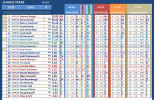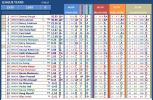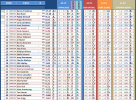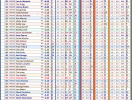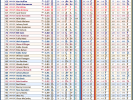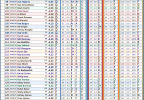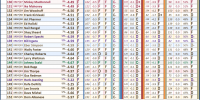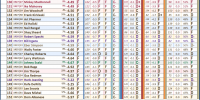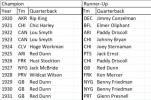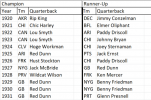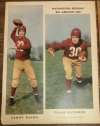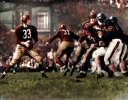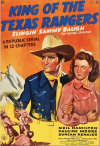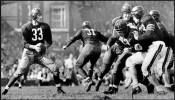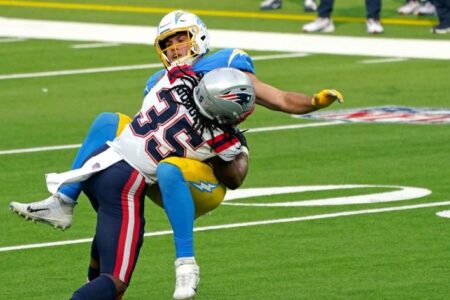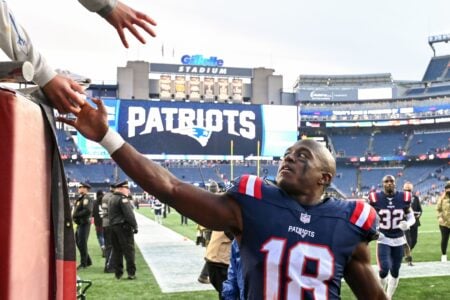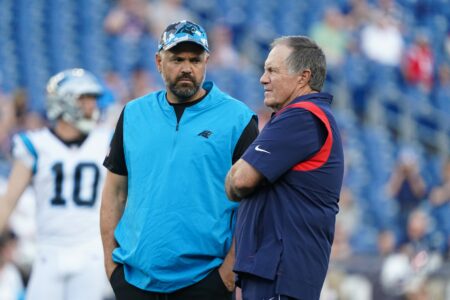Okay...so I'm posting the 1920-31 rankings below. And I'll include some interesting stuff I came across while compiling the data...
As with all the rankings, this isn't a final order or anything...it's using paramaters within the norms I've been using for other lists...and hopefull this establishes some player tiers. And I should emphaize here that the rankings are not ranking football players; they're ranking quarterbacks with a heavy emphasis on passing skills. So you might see Red Grange or some other star somewhere down the list; that just means a TD pass qualified him for the list. A lot of these guys are not listed as quarterbacks, including guys at the top. Leading passers who threw a lot might be fullbacks, halfbacks, etc...and quarterbacks might be guys who mainly run, hand off the ball, play cornerback on defense, and punt...which is why the actual passing touchdown stats are so critical. When a player made an all-pro team as a non-QB, I gave them the equivalent of a pro bowl selection; they only got the additoinal all-pro if they were selected as a quarterback.
For championships, I settled on the first place team getting 1.5 total points, the second place team getting .5 points, and the third place team getting .25 points. It sounds strange, but it's mainly because of uncertainty about who was the most deserving team in many years, balanced out by the fact that teams knew they needed to have the best win pct (and ties were thrown out, not counting as wins or losses.) It as a pretty stupid overall system; bexause the league was often so uneven in terms fo competition, scheduling, etc. it would make playoff games all the more important. So, that's the point system I'm using for now.
So, let's start from the top of the list. I've already written quite a bit about
Benny Friedman (1) and
Red Dunn (2). Currently, just with a quick check of 1920-2020, Friedman is #12 all-time and Dunn is #28. Will they stay there? It depends on how era-adjusted you want it to be...if you want a true era-adjusted comparison, I think Friedman is a top 25 guy depending on the weighting and Dunn is a top 50 guy. I try to size up these guys on what I see as their floor, whatever settings you're using within reason.
Paddy Driscoll (3), Joey Sternaman (17), Jimmy Conzelman (21). I'm going to group these three together because, by accolade, they're usually at or near the top of QB lists from the 1920s. Driscoll was obviously a very good player and also threw his share of TD passes; it's just that as passers, other guys were better. Stripped of his defense, punting, etc. Driscoll is still a good quarterback but not a legendary one. Conzelman began his career as a passing QB and then settled into other roles in the offense like RB and WR. And Sternaman is the most extreme of them; a QB in name only...he barely threw TD passes, though other guys on the team did.
Curly Lambeau (5). Being in the top 5 of your decade is a good place to be, so I won't say Lambeau isn't worthy of a lot of praise. I'd just point out that, while he's often credited for being an innovator of the passing game, there were other players who were also excelling; and while he won championships, they were all after Red Dunn came along and became the team's passer.
Hoge Workman (4), Sonny Winters (9), Elmer Oliphant (10). All three of these guys were one-hit wonders who had monster seasons and then disappeared. Workman was a baseball player who tried football for a season, threw 8 TD passes (5th best peak score of the decade) and led his team to a championship. He's ranked 4th, which seems quite high for a player with one season, but after spending an hour looking for vulnerabilities in the formulas to account for this, I realized it's because he has two "solid" and undisputable sources of points: a championship and a peak score. Both of those stay the same regardless of small sample size adjustments.
Oliphant is a very interesting character. He played for the 1921 Buffalo team that got hosed by George Halas in the Staley Swindle. He had one of the best seasons of any player of the decade and then just stopped playing to do other things, like being a farmer.
Hust Stockton (6) and Ernie Nevers (8). John Stockton's grandfather, so that's cool. There was also a guy named Milt Romney who was Mitt Romney's grandfather. Stockton is maybe the most "normal" guy on the list in terms of what we look for in a quarterback. Played well for a handful of years, was a "francise QB" as the team's consistent leading passer, won a championship as his career highlight. Nevers is pretty similar; a bunch of passing touchdowns and wins, though he's more a Philip Rivers type...a bunch of good seasons but no spectacular ones.
Lou Smyth (7). Appears to be our Brad Johnson. 2X champion with pretty good passing stats but nothing spectacular about him either.
Al Mahrt (11). He was actually coming into the NFL on the tail end of his career, playing in the Ohio league during the 1910s and winning the city championship 3 times. He'll probably move up when he gets some credit for seaosns played in an alternative league. In 1920, the first season, he threw 7 TD passes to lead the league, but he was finished a couple of years later.
View attachment 31672
View attachment 31673
View attachment 31674
View attachment 31675
View attachment 31676





